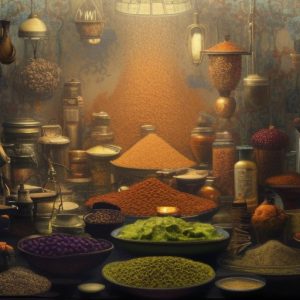
Vegan food has long been a controversial diet choice, but with the addition of monosodium glutamate, its potential for mass consumption has risen. The benefits of MSG are numerous, from improved flavor to increased nutrition. However, as with anything, there are potential risks associated with consuming too much. This article will take a look at the pros and cons of vegan food, the need for MSG, its potential benefits and risks, and how it can be used to enhance vegan food. Examples of vegan food enhanced with MSG will also be provided. So, strap in and prepare to discover the world of vegan food and its newfound potential with MSG.
I. Introduction
The future of food is an ever-evolving landscape of possibilities. For those who have chosen the vegan lifestyle, the challenge is to find a way to create a viable, nutritious, and delicious diet. Unfortunately, many vegan dishes lack the punch of flavor and umami that can make food truly satisfying. Enter monosodium glutamate, the savory flavor enhancer that can turn a bland vegan dish into a delectable meal. In this article, we’ll explore how monosodium glutamate can revolutionize vegan food and make it a viable option for the masses.
Our journey begins with a look at the pros and cons of vegan food. We’ll then explore how monosodium glutamate can benefit vegan dishes, as well as its potential risks. We’ll also discuss the impact of monosodium glutamate on vegan food and provide some examples of vegan dishes enhanced with this savory flavor enhancer. Finally, we’ll wrap up our discussion with a conclusion. So, let’s get started!
II. Pros and Cons of Vegan Food
Vegan food has long been hailed for its health benefits. It provides a wealth of vitamins and minerals, is low in saturated fat, and is free from animal by-products. It can be a great way to reduce the risk of heart disease and other chronic illnesses. But vegan food also has its drawbacks. It often lacks the flavor and texture of traditional dishes, and can be difficult to find in restaurants.

So, what can be done to make vegan food more palatable and enjoyable? Enter monosodium glutamate, or MSG. This flavor enhancer is a common ingredient in processed foods, and is also found naturally in some vegetables and other foods. It can bring out the flavor of vegan dishes, making them more enjoyable and satisfying. It can also help to mask the bitterness of certain plant-based ingredients, giving them a more rounded and balanced flavor.
But monosodium glutamate isn’t without its potential risks. It has been linked to headaches, nausea, and other digestive issues in some individuals, and it can be difficult to control the amount used in a dish. On the other hand, many people find that using MSG in moderation does not cause any adverse reactions. Ultimately, it’s up to the individual to decide if the potential benefits outweigh the potential risks.
III. The Need for Monosodium Glutamate
Vegan food has been gaining in popularity for years, but it can still be lacking in flavor and texture. If you’ve ever had a vegan dish that seemed to lack that certain something, then you may have been experiencing what is known as the “umami” gap. Umami is a Japanese term used to describe the savory flavor found in many foods that make them more satisfying. Monosodium glutamate, more commonly known as MSG, is the perfect tool to bridge this gap. MSG is a flavor enhancer that adds a savory, umami flavor to food that can make vegan dishes more enjoyable.

Using MSG to bridge the gap between vegan dishes and other foods is not a new concept. In fact, it has been used for decades in Chinese and Japanese cuisine to enhance the flavor of dishes. It can be used in a variety of ways, from adding it directly to a dish to using it as an ingredient in sauces and marinades. It can also be used to create mock meat dishes that have a more realistic flavor and texture. MSG has become an indispensable tool for vegan chefs looking to make their dishes more delicious and satisfying.
Aside from its flavor-enhancing properties, MSG also has a number of other benefits. It can be used to reduce the amount of sodium in a dish while still adding flavor, making it a great tool for those trying to watch their salt intake. It also helps to reduce cooking time and can help keep vegan dishes from becoming soggy or overcooked. Finally, MSG is a natural ingredient, making it a healthier choice than other flavor enhancers.
Given the multitude of benefits that MSG offers, it’s easy to see why it has become an essential ingredient for vegan chefs. With just a sprinkle of MSG, vegan dishes can go from bland to delicious, making them a more viable option for the masses.
IV. The Benefits of Monosodium Glutamate
Monosodium glutamate, or MSG, has long been used as a flavor enhancer in many foods to give them a savory umami flavor. In recent years, it has become a popular choice for vegan cooks looking for a way to add some extra flavor and depth to their dishes.

The benefits of MSG for vegan foods are numerous. It adds a layer of flavor to dishes that can often be lacking without it. It is also a great way to reduce the amount of salt or sugar that might otherwise be used for flavor enhancement. Additionally, MSG is a great way to add a subtle heat to vegan dishes without overpowering the other flavors. It is also an excellent way to bring out the natural flavors of vegetables and other vegan ingredients.
MSG also has the potential to make vegan dishes more appealing to a wider audience. By adding flavor and depth to vegan dishes, it can make them more attractive to people who may not be accustomed to vegan cooking. This could help to increase the popularity of vegan dishes and make them more widely accepted.
Finally, MSG is a great way to reduce the amount of fat and calories in vegan dishes. By reducing the amount of oil or butter that is used, MSG can help to make vegan dishes healthier and more nutritious.
V. The Potential Risks of Monosodium Glutamate
Monosodium glutamate (MSG) is an important flavor enhancer, but it’s not without its risks. MSG has been linked to a range of health problems, including headaches, nausea, and a temporary swelling of the face and neck. For those with asthma, MSG can trigger attacks. Additionally, if consumed in large amounts, MSG can also cause heart palpitations and dizziness.

Though the health risks of MSG are well documented, it’s important to note that the levels used to enhance flavors in foods are much lower than those associated with negative side effects. Additionally, MSG is often used in conjunction with other ingredients, such as herbs and spices, which can help to reduce the potential risks.
It’s also worth noting that the majority of MSG consumed today is from natural sources, such as tomatoes, Parmesan cheese, and mushrooms. Processed foods are also a major source of MSG, as it’s often used as a flavor enhancer in many processed foods. So, while MSG does have its potential risks, it’s important to keep in mind that it’s also found in natural sources, and the levels used in food are much lower than those linked to negative side effects.
VI. The Impact of Monosodium Glutamate on Vegan Food
Vegan food has long been seen as a nutritious and sustainable way to eat, but it’s often lacking in flavor. This is where monosodium glutamate can come in and add a punch of umami that can make vegan food more enjoyable. As well as adding flavor, monosodium glutamate can help to enhance the nutritional value of vegan dishes by providing essential amino acids.

Monosodium glutamate can also reduce the amount of salt and fat needed in vegan dishes. By using monosodium glutamate to add flavor, less salt and fat are needed to make vegan food more palatable. This can help to reduce the amount of cholesterol and other unhealthy substances in vegan dishes.
In addition, monosodium glutamate can help to make vegan food more satisfying. The savory flavor enhancer can make vegan dishes more “meaty” in texture and taste. This can help to make vegan dishes more appealing to those who are used to eating meat.
Finally, monosodium glutamate can help to reduce food waste. By adding more flavor to vegan dishes, people are more likely to eat them and less likely to discard them. This can help to reduce the amount of food waste produced by vegan dishes.
In short, monosodium glutamate can revolutionize vegan food and make it a viable option for the masses. By adding flavor, reducing salt and fat, and making vegan dishes more palatable, monosodium glutamate can help to make vegan food a truly viable food alternative.
VII. Examples of Vegan Food Enhanced with Monosodium Glutamate
Monosodium glutamate can be a powerful ally for vegan food, adding a punch of flavor that can make even the most mundane dish into a delectable feast. Let’s take a look at some examples of vegan dishes enhanced with monosodium glutamate.

One of the classic vegan dishes that can benefit from a dash of monosodium glutamate is tofu. By adding just a pinch of this savory flavor enhancer, the blandness of tofu can be turned into a delicious treat. The same can be said of tempeh, another vegan staple. With a little monosodium glutamate, tempeh can become a flavorful and satisfying meal.
Even vegan sauces and dressings can benefit from a bit of monosodium glutamate. A sprinkle of the flavor enhancer can bring out the subtle herbs and spices in vegan marinara sauce, making it even more delicious. The same can be said for vegan dressings, providing a rich, umami flavor that can make salads and sandwiches truly satisfying.
Vegan desserts can also be enhanced with monosodium glutamate. For example, a sprinkle of the flavor enhancer can turn a plain vegan cookie into a rich and decadent treat. Or, a bit of monosodium glutamate can bring out the subtle sweetness of vegan ice cream, making it even more delicious.
From tofu to cookies, monosodium glutamate can revolutionize vegan food. With just a pinch of this savory flavor enhancer, even the most basic vegan dish can become a delectable meal. So, if you’re looking to upgrade your vegan diet, don’t forget to keep some monosodium glutamate on hand.
VIII. Conclusion
Our exploration of monosodium glutamate has shown us that it can be a powerful tool for vegan cooks. It can take vegan dishes from bland and unappealing to delicious and savory. While monosodium glutamate does come with some potential risks, these can be mitigated with careful use. In the end, monosodium glutamate can be an invaluable ingredient for vegan cooks, providing a way to make vegan food more appealing and accessible to the masses. So, the next time you’re vegan cooking, don’t forget to reach for that monosodium glutamate. You won’t regret it!






